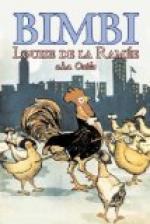He went on through the streets, past the stone man-at-arms of the guardhouse, and so into the place where the great church was, and where near it stood his father Karl Strehla’s house, with a sculptured Bethlehem over the doorway, and the Pilgrimage of the Three Kings painted on its wall. He had been sent on a long errand outside the gates in the afternoon, over the frozen fields and the broad white snow, and had been belated, and had thought he had heard the wolves behind him at every step, and had reached the town in a great state of terror, thankful with all his little panting heart to see the oil lamp burning under the first house shrine. But he had not forgotten to call for the beer, and he carried it carefully now, though his hands were so numb that he was afraid they would let the jug down every moment.
The snow outlined with white every gable and cornice of the beautiful old wooden houses; the moonlight shone on the gilded signs, the lambs, the grapes, the eagles, and all the quaint devices that hung before the doors; covered lamps burned before the Nativities and Crucifixions painted on the walls or let into the woodwork; here and there, where a shutter had not been closed, a ruddy fire-light lit up a homely interior, with a noisy band of children clustering round the house-mother and a big brown loaf, or some gossips spinning and listening to the cobbler’s or the barber’s story of a neighbor, while the oil wicks glimmered, and the hearth logs blazed, and the chestnuts sputtered in their iron roasting pot. Little August saw all these things, as he saw everything with his two big bright eyes, that had such curious lights and shadows in them; but he went needfully on his way for the sake of the beer which a single slip of the foot would make him spill. At his knock and call the solid oak door, four centuries old if one, flew open, and the boy darted in with his beer and shouted with all the force of mirthful lungs: “Oh, dear Hirschvogel, but for the thought of you I should have died!”
It was a large barren room into which he rushed with so much pleasure, and the bricks were bare and uneven. It had a walnut-wood press, handsome and very old, a broad deal table, and several wooden stools, for all its furniture; but at the top of the chamber, sending out warmth and color together as the lamp shed its rays upon it, was a tower of porcelain, burnished with all the hues of a king’s peacock and a queen’s jewels, and surmounted with armed figures, and shields, and flowers of heraldry, and a great golden crown upon the highest summit of all.
It was a stove of 1532, and on it were the letters H. R. H., for it was in every portion the handwork of the great potter of Nurnberg, Augustin Hirschvogel, who put his mark thus, as all the world knows.




